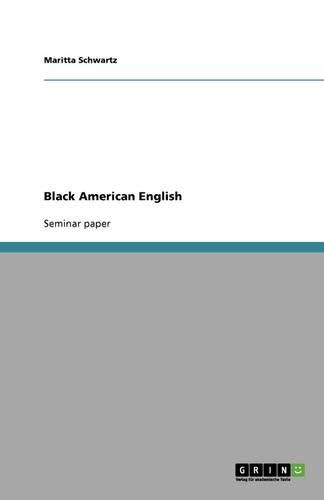Readings Newsletter
Become a Readings Member to make your shopping experience even easier.
Sign in or sign up for free!
You’re not far away from qualifying for FREE standard shipping within Australia
You’ve qualified for FREE standard shipping within Australia
The cart is loading…






Seminar paper from the year 1998 in the subject American Studies - Linguistics, grade: 1 (A), Ruhr-University of Bochum (English Seminar), course: Seminar: Introduction to african-american Literature, 4 entries in the bibliography, language: English, abstract: Introduction In this essay we are going to deal with Black American English and its specific features and differences to Standard English. The analysis includes an introduction to the grammar of BAE, its specific vocabulary, the African elements in BAE and the ethnographic speech behaviour connected with the use of BAE. At the beginning a short survey will be given on who actually speaks BAE. 1. Who speaks Black American English? In general, we can say that all those speak BAE (= Black American English) who consider themselves to be Black. Those are 80% of the Black American population. But also some Puerto Ricans and members of the southern plantation owning class do use this language. In former times BAE was also used by some Indian tribes and Seminoles. The dialect patterns depend on social factors rather than racial or geographic. Many people are capable of several dialects, and also some Whites do speak those dialects. The history of the Afro-American languages correlates with a caste system. The use of BAE indicates a low level of education as well as a low social standard. It indicates that the speaker belongs to a social group that has remained unassimilated to the white culture. Rich black families tend to speak Standard English. In the use of Standard English among Blacks agegrading plays a great role. First the children adopt the language they learn in their peer groups, later on they learn Standard English in school. The age-grading towards Standard English is closely connected with status grading, i.e. children of families with a higher social level tend to the use of Standard English. The higher a Black climbs on the social ladder the more he tends to Standard English. In general, women find it e
$9.00 standard shipping within Australia
FREE standard shipping within Australia for orders over $100.00
Express & International shipping calculated at checkout
Seminar paper from the year 1998 in the subject American Studies - Linguistics, grade: 1 (A), Ruhr-University of Bochum (English Seminar), course: Seminar: Introduction to african-american Literature, 4 entries in the bibliography, language: English, abstract: Introduction In this essay we are going to deal with Black American English and its specific features and differences to Standard English. The analysis includes an introduction to the grammar of BAE, its specific vocabulary, the African elements in BAE and the ethnographic speech behaviour connected with the use of BAE. At the beginning a short survey will be given on who actually speaks BAE. 1. Who speaks Black American English? In general, we can say that all those speak BAE (= Black American English) who consider themselves to be Black. Those are 80% of the Black American population. But also some Puerto Ricans and members of the southern plantation owning class do use this language. In former times BAE was also used by some Indian tribes and Seminoles. The dialect patterns depend on social factors rather than racial or geographic. Many people are capable of several dialects, and also some Whites do speak those dialects. The history of the Afro-American languages correlates with a caste system. The use of BAE indicates a low level of education as well as a low social standard. It indicates that the speaker belongs to a social group that has remained unassimilated to the white culture. Rich black families tend to speak Standard English. In the use of Standard English among Blacks agegrading plays a great role. First the children adopt the language they learn in their peer groups, later on they learn Standard English in school. The age-grading towards Standard English is closely connected with status grading, i.e. children of families with a higher social level tend to the use of Standard English. The higher a Black climbs on the social ladder the more he tends to Standard English. In general, women find it e